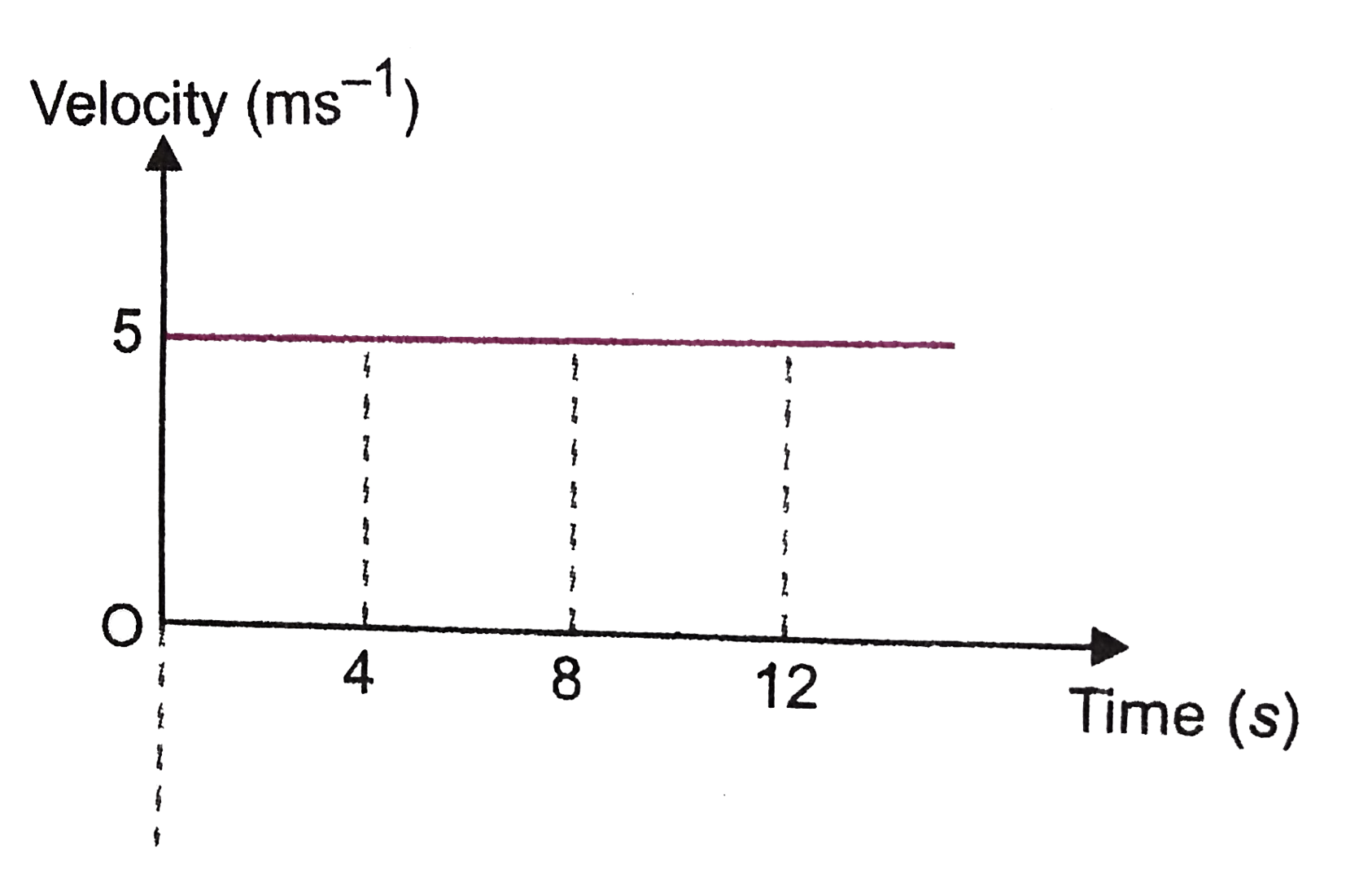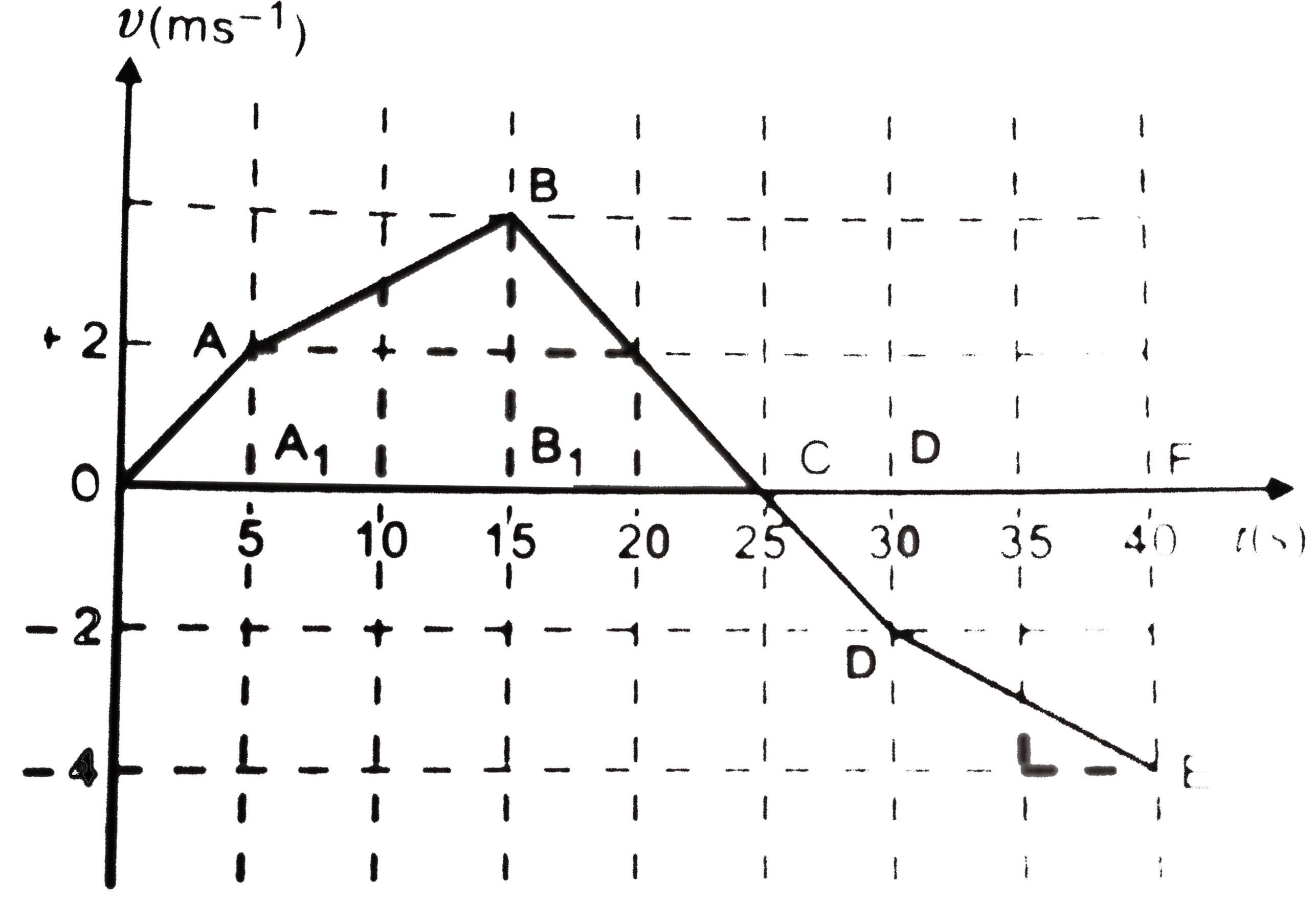Complete Solutions to Sample Promlem of chapter KINEMATICS of Class 11 book with complete answers and questions
| Class 11 | PHYSICS |
| Chapter | KINEMATICS |
| PRADEEP | Sample Promlem |
| Number Of Questions | 25 |
| Academic Year | 2023-24 |
A man walks for `1 "minute" ` at a speed of `1 m s^(-1)` and then runs for `1 min` at a speed of `3 ms ^(-1)` along straight track, What is the average speed of the man?
View SolutionA cyclist moving on a circular track of rakies `200 m` completely is 5 minutes. What his (a) average speed (b) average velocity in one full revolution?
View SolutionThe velocity time graph of a uniform motion of a partcile along a st. line id shown in Fig. 2 (a).20. What is the dispacement of the particle in time interval `8 s` to 12 s`?
 .
.
View SolutionThe displacement (in metre) of a particle moving along x-axis is given by `x=18t +5t^(2).` Calculate (i) the instantaneous velocity `t=2 s` (ii) average velocity between `t=2 s` to `t=3 s` (iii) instantaneous acceleration.
View SolutionA particle is moving with a uniform acceleration `4 m s^(-2)` for time 2 second and then `5 m s^(-20` for time 3 seconds`. What is the average acceleration of particle during motion.
View SolutionA particle starts with an initial velocity `3.0 m s^(-1)` along the positive `x-`direction and it accelerates uniformly at the rate of `0.60 m s^(-2)` .(a) Find the distance traveled by it in the first three seconds. (b) Hew much time does it take to reach the velocity `9.0 m//s` (c) How much distance will it cover in reaching the velocity `9.0 m s^(-1)` ?
View SolutionA particle having initial velocity `5 m//s` moves with a constant acceleration `2 m s^(-2)`, for time 10 second` `along a straight line. Find the displacement of the particle in the last one second and the total distance traveled in 10 seconds`.
View SolutionThe velocity-time graph line motion is shown in Fing. 2 (b).7. Find (a) the distance travelled and (b) displacement, between `5 and 40 s`. (c ) Acceleration betwwn `15 to 25 seconds.

View SolutionTwo forces `20 N and 5 N` are acting at an angle of `12^0` between them.
View SolutionTwo forces `F and 2 F` newton act on a particle. If the first force be doubled and the second force be increased by `16 ` newtons, the direction of the resultant remains unaltered. Find the value of `F`.
View SolutionA bob weighing `50` gram hangs vertically at the end of a string `50 cm long`. If `20` gram force is applied horizontally, by how much distance the bob is pulled aside from its initial position when it reaches in equilibrium position?
View SolutionA river `500 m` wide flows at a rate at a rate of `4 km h^(-1)`. A swimmer who can swim at `8 km h^(-1)`. In still water, wishes to cross the river straight. (i) Along what direction must he strike? (ii) What should be his resultant velocity. (iii) What is the time of crossing the river?
View SolutionA man is walking on a level road at a speed of `3.2 km^(-1)`. Rain drops fall vertically with a speed of `4.0 km h^(-1)`. Find the velocity of the raindrops with respect to the man. In which direction, the man should hold his umbrella to protect himself from rain ?
View SolutionA mass of `2 kg` lies lies on a plane making an anged `30^(0)` to the horizontal. Resolve its weight along and perpendicular to the plane. Assume `g=10 ms^(-2)`.
View SolutionA `50 N` boy hangs from it, as shown in Fig. 2 (c ) .35 (a). Find the senstion in the two parts of the rope.
View SolutionIf `vec A =2 hat I -5 hat k`, find (i) | vec A| and (ii) the direction cositnes of the vector `vec A`.
View SolutionA constant force `(2 hat i+ 3 hat j+ 4 hat k)` mewton pewton produces a desplacement of `(2 hati +3 hat j+ 4 hat k)` metre. What is the word done?
View SolutionIf the magnitudes of two vectors are `2 and 3` and the magnitude of their scalar product is `3 sqrt 2`, then find the angle between the vectors.
View SolutionCalculate the area of the parallelogram whose two adjacent sides are formed by the vectors `vec A xx 4 hat I + 3 hat j and vec B =- 3 hati +6 hat j.
View SolutionFind the magnitude of torque of a force `vec F = )-3 hat i+ hat j +5 hat k)`. Newton acting at the point `vec r =(7 hat j+3 hat j +hat k) metre`.
View SolutionIf the position vector of a particle is given by `vec r =(4 cos 2t) hat j + (6t) hat k m`, calculate its acceleration at `t=pi//4 second `.
View SolutionA football player kicks a ball at ball at an angle of `30 ^(0)` with the horizontal with an initial speed of `20 m//s`. Assuming that the ball travels in a vertical plane, calculate (a) the time at which the ball reaches the highest point (b) maximum height reached (c ) the horizontal range of the ball (d) the time for which the ball is in air. `g =10 m//s^(2)`.
View SolutionCalculate the angular speed of the flywheel making `240` revlocutions per minute.
View SolutionA storne tied to the end of a string `2 m` long is whirled in a horizontal circle with constant speed. If the stone makes `10` revolutions in `20 s, caluate the magnitude and direction of `10` revolutions in `20 s`, calculate the magnitude and direction of accelertion.
View SolutionA motor car travelling at `30 m//s` on a circular road of radius `500m`. It is increasing its speed at the rate of `2 ms^(-2)`. What its accleratopm ?
View Solution
Sample Promlem questions and complete solutions for chapter KINEMATICS of PRADEEP PHYSICS (HINGLISH) of Class 11
All Exercises from PRADEEP Class 11 PHYSICS KINEMATICS
- 1 Problems for practice
- 1 Con ceptual Problems
- 1 Conceptual Problems
- 1 Fill in the blanks
- 1 Long answer
- 1 Multiple choice
- 1 NCERT Assertion-Reaseon Type
- 1 NCERT Comprehension
- 1 NCERT multiple
- 1 Short answer
- 1 SolvedExamples
- 1 Very short
- 2 Con ceptual Problems
- 2 Fill in the blanks
- 2 Long answer
- 2 Multiple choice
- 2 NCERT multiple
- 2 Problems for practice
- 2 Short answer
- 2 SolvedExamples
- 2 Very short
- 3 Con ceptual Problems
- 3 Fill in the blanks
- 3 Long answer
- 3 Multiple choice
- 3 NCERT multiple
- 3 Problems for practice
- 3 Short answer
- 3 SolvedExamples
- 3 Very short
- 4 Con ceptual Problems
- 4 Conceptual Problems
- 4 Fill in the blanks
- 4 Long answer
- 4 Multiple choice
- 4 NCERT Integer type
- 4 NCERT multiple Choice
- 4 Problems for practice
- 4 Short answer
- 4 SolvedExamples
- 4 Very short
- 5 Long answer (NCERT)
- 5 Short answer
- 5 Very short
- 6 Long answer (NCERT)
- 6 Short answer
- 6 Very short
- Additional Exercises
- Advanced Problems
- Higher order thinking skills
- Motion
- NCRT Exercises
- Sample Promlem
- Value based